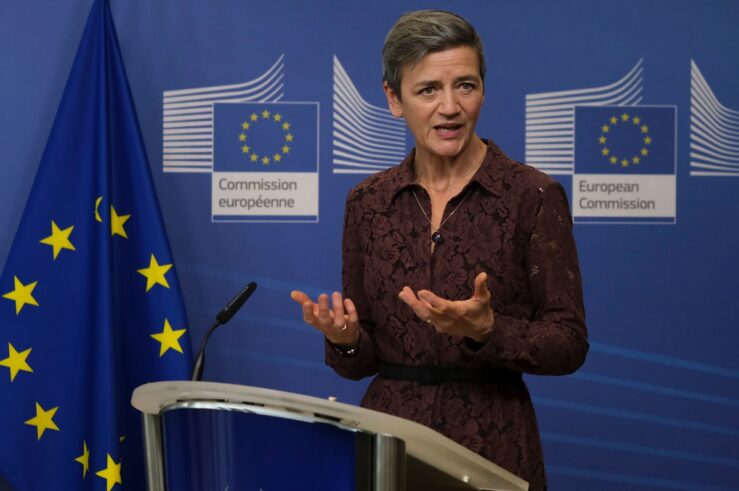Showing results for: “DMA”
App Stores as Public Utilities?
In a new paper, Giuseppe Colangelo and Oscar Borgogno investigate whether antitrust policy is sufficiently flexible to keep up with the dynamics of digital app stores, and whether regulatory interventions are required in order to address their unique features. The authors summarize their findings in this blog post. App stores are at the forefront of ... App Stores as Public Utilities?
Reflections on the recent filings in Qualcomm/FTC dispute
On Monday, the U.S. Federal Trade Commission and Qualcomm reportedly requested a 30 day delay to a preliminary ruling in their ongoing dispute over the terms of Qualcomm’s licensing agreements–indicating that they may seek a settlement. The dispute raises important issues regarding the scope of so-called FRAND (“fair reasonable and non-discriminatory”) commitments in the context ... Reflections on the recent filings in Qualcomm/FTC dispute
Consumer Welfare-Based Antitrust Enforcement is the Superior Means to Deal with Large Digital-Platform Competition Issues
There has been a rapid proliferation of proposals in recent years to closely regulate competition among large digital platforms. The European Union’s Digital Markets Act (DMA, which will become effective in 2023) imposes a variety of data-use, interoperability, and non-self-preferencing obligations on digital “gatekeeper” firms. A host of other regulatory schemes are being considered in ... Consumer Welfare-Based Antitrust Enforcement is the Superior Means to Deal with Large Digital-Platform Competition Issues
Goodbye Margrethe, Hello Didier: What Next for European Competition Law?
European Commissioner for Competition Margrethe Vestager announced Sept. 5 that she was leaving her position after nearly a decade in charge, which for the last four years has also included holding the title of “executive vice president of the European Commission for a Europe fit for the Digital Age.” Her departure caps off an uncharacteristically ... Goodbye Margrethe, Hello Didier: What Next for European Competition Law?
Lina Khan’s Christmas Wish Is To Have Margrethe Vestager’s Powers
Federal Trade Commission (FTC) Chair Lina Khan has just sent her holiday wishlist to Santa Claus. It comes in the form of a policy statement on unfair methods of competition (UMC) that the FTC approved last week by a 3-1 vote. If there’s anything to be gleaned from the document, it’s that Khan and the ... Lina Khan’s Christmas Wish Is To Have Margrethe Vestager’s Powers
The View from the United Kingdom: A TOTM Q&A with John Fingleton
What is the UK doing in the field of digital-market regulation, and what do you think it is achieving? There are probably four areas to consider. The first is that the UK’s jurisdiction on mergers increased with Brexit. The UK is not subject to the same turnover threshold as under European law, and this enables ... The View from the United Kingdom: A TOTM Q&A with John Fingleton
Building the Digital Future: Can the EU Foster a Dynamic and Crime-Free Internet?
The European Commission has unveiled draft legislation (the Digital Services Act, or “DSA”) that would overhaul the rules governing the online lives of its citizens. The draft rules are something of a mixed bag. While online markets present important challenges for law enforcement, the DSA would significantly increase the cost of doing business in Europe ... Building the Digital Future: Can the EU Foster a Dynamic and Crime-Free Internet?
Exclusionary Pricing Without the Exclusion: Unpacking Qualcomm’s No License, No Chips Policy
Qualcomm is currently in the midst of a high-profile antitrust case against the FTC. At the heart of these proceedings lies Qualcomm’s so-called “No License, No Chips” (NLNC) policy, whereby it purportedly refuses to sell chips to OEMs that have not concluded a license agreement covering its underlying intellectual property. According to the FTC and ... Exclusionary Pricing Without the Exclusion: Unpacking Qualcomm’s No License, No Chips Policy
Coase and the 800 Pound Man
Ronald Coase has been on my mind quite a bit lately. His ideas have made a couple of recent appearances in my business organizations class. As I’ve explained before, we spend the first day of Bus Orgs contrasting F.A. Hayek’s The Use of Knowledge in Society, which argues that central planning is destined to fail because planners cannot gather ... Coase and the 800 Pound Man
Google, Amazon, Switching Costs, and Red Herrings
Way back in May, I cracked wise about the Federal Trade Commission’s (FTC) fictional “Bureau of Let’s Sue Meta,” noting that the commission’s proposal (really, an “order to show cause”) to modify its 2020 settlement of a consumer-protection matter with what had then been Facebook—in other words, a settlement modifying a 2012 settlement—was the FTC’s ... Google, Amazon, Switching Costs, and Red Herrings
The CJEU’s Decision in Meta’s Competition Case: Consequences for Personalized Advertising Under the GDPR (Part 1)
Today’s judgment from the Court of Justice of the European Union (CJEU) in Meta’s case (Case C-252/21) offers new insights into the complexities surrounding personalized advertising under the EU General Data Protection Regulation (GDPR). In the decision, in which the CJEU gave the green light to an attempt by the German competition authority (FCO) to ... The CJEU’s Decision in Meta’s Competition Case: Consequences for Personalized Advertising Under the GDPR (Part 1)
Interesting Section 2 Developments
A pair of interesting antitrust appellate decisions have been released over the past few days involving single firm conduct and Section 2: Cascade Health Solutions v. PeaceHealth (9th Cir.) and Broadcom v. Qualcomm (3rd Cir.). First, the Ninth Circuit’s decision in Cascade Health Solutions v. PeaceHealth reversed the district court’s Lepage’s based jury instruction in ... Interesting Section 2 Developments










